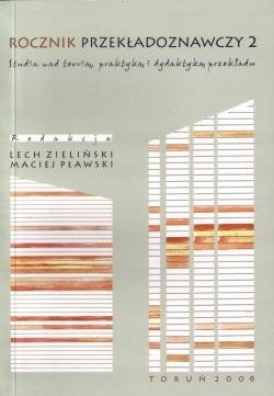Translation as a means of understanding culture and intercul-tural integration in the context of cognitive linguistics
DOI:
https://doi.org/10.12775/RP.2006.013Keywords
translation, understanding culture, intercultural integration, cognitive linguisticsAbstract
The following article focuses on translation in the light of ‘scopos’ theory and the theory defining translation as a kind of translating activity. Translating activity is not only a form of intercultural activity and does not limit itself to translating the original text into another language, but it is also connected with the transfer of cultural aware-ness. Cultural determinant of translation requires from the translator adequate prediction, comprehension of scopos and correct prediction of cognitive aspects characteristic of a recipient of the translated text. The author applies the theory of cognitive linguistics to describe cognitive processes. The following notions are explained: text, context, words, comprehension, perception ,meaning ,sense. The problems of mutual dependence between language and culture have been discussed.This disquisition is summed up by a short presentation of translation strategies aiming at the affirmation that the translated text is coherent with the target culture, which is a requirement of intercultural integration.
References
Anusiewicz, J., Dąbrowska, A., Fleischer, M. 2000, Językowy obraz świata i kultura. Projekt koncepcji badawczej, [w:] Językowy obraz świata i kultura, red. A. Dąbrowska, J. Anusiewicz, Wrocław, s. 11–44.
Bartmiński, J. 1993, Język a kultura, [w:] Encyklopedia kultury polskiej XX wieku, red. J. Bartmiński, Wrocław, s. 18–19.
Bartmiński, J. 1999, Punkt widzenia, perspektywa, językowy obraz świata, [w:] Językowy obraz świata, red. J. Bartmiński, Lublin, s. 103–120.
Cieśla, D. 1999, Narzędzia językoznawstwa kognitywnego – nie tylko dla językoznawców, http://venus.ci.uw.edu.pl/~rubikon/Nr5/ciesla.html.
Dakowska, M. 2001, Psycholingwistyczne podstawy dydaktyki języków obcych, Warszawa.
Duszak, A. 1998, Tekst, dyskurs, komunikacja międzykulturowa, Warszawa.
Fauconnier, G., Turner, M. 1996, Blending as central process of grammar, [w:] Conceptual structure, discourse and information, red. A. Goldberg, Stanford, s. 113–129.
Fauconnier, G., Turner, M. 2001, Tworzenie amalgamatów jako jeden z głównych procesów w gramatyce, [w:] Językoznawstwo kognitywne II. Zjawiska pragmatyczne, red. W. Kubiński, D. Stanulewicz, Gdańsk, s. 173–211.
Frawley, W. 1984, Prolegomenon to a theory of translation, [w:] Translation. Literary, linguistic, and philisophical perspectives, red. W. Frawley, London, s. 159–175.
Ginter, A. 2003, Kilka uwag o przekładzie elementów kulturowych w kontekście badań nad presupozycją, [w:] Język, literatura, dydaktyka, red. J. Opoka, A. Oskierka, Łódź, s. 349–358.
Goddard, C., Wierzbicka, A. 2001, Język, kultura i znaczenie: semantyka międzykulturowa, [w:] Kognitywne podstawy języka i językoznawstwa, red. E. Tabakowska, Kraków, s. 175–202.
Hejwowski, K. 2004, Kognitywno-komunikacyjna teoria przekładu, Warszawa.
Holz-Mänttäri, J. 1984, Translatorisches Handeln: Theorie und Methode, Helsinki.
Holz-Mänttäri, J. 1996, Evolutionäre Translationstheorie, [w:] Die Evolutionäre Erkenntnistheorie im Spiegel der Wissenschaften, red. R., Riedl, M., Delpos, Wien, s. 306–332.
Kubiński, W. 2000, Kognitywna teoria przekładu: nieuchronna oczywistość czy bezużyteczna mrzonka?, [w:] Przekładając nieprzekładalne, red. W. Kubiński, O. Kubińska, T. Z. Wolański, Gdańsk, s. 51–58.
Kupsch-Losereit, S. 1997, Übersetzen: ein integrativ-konstruktiver Verstehens- und Produktionsprozeß, htpp://www.fask.unimainz.de/user/kupsch/integrativerp.html
Ożdżyński, J. 2002, Formy wypowiedzi w przestrzeni kulturowej, [w:] Konteksty kulturowe w dyskursie edukacyjnym, red. J. Ożdżyński, T. Rittel, Kraków, s. 85–107.
Panasiuk, I. 2003, Miejsce modelu lakun w obrębie teorii tłumaczenia kultur, [w:] Teoria i dydaktyka przekładu, red. K. Hejwowski, Olecko, s. 99–112.
Reiß, K., Vermeer, H. J. 1984, Grundlegung einer allgemeinen Translations-theorie, Tübingen.
Seleskovitch, D. 1980, Beitrag der Sprachmittlung zur Untersuchung des Verstehens, [w:] Sprache und Verstehen: Kongressberichte der 10. Jahrestagung der Gesellschaft für Angewandte Linguistik GAL e.V., t. 1, red. P. Kühlwein, A. Raasch, Tübingen, s. 155–160.
Śniatkowski, S. 2002, Definicje językowo-kulturowe w ujęciu lingwoedukacyjnym, [w:] Konteksty kulturowe w dyskursie edukacyjnym, red. J. Ożdżyński, T. Rittel, Kraków, s. 377–396.
Tabakowska, E. 2000, Językoznawstwo kognitywne – nowe czy dawne horyzonty badań nad językiem?, [w:] Język trzeciego tysiąclecia, seria „Język i komunikacja” 1, red. G. Szpila, Kraków, s. 57–68.
Tabakowska, E. 2001, Językoznawstwo kognitywne a poetyka przekładu, Kraków.
Downloads
Published
Issue
Section
Stats
Number of views and downloads: 927
Number of citations: 0



